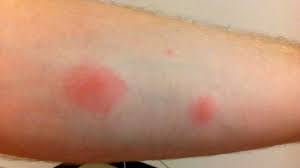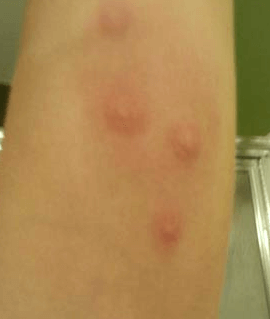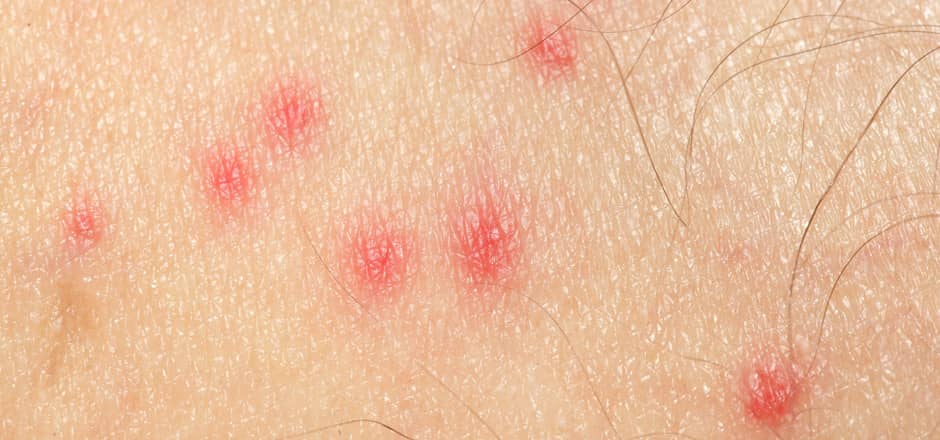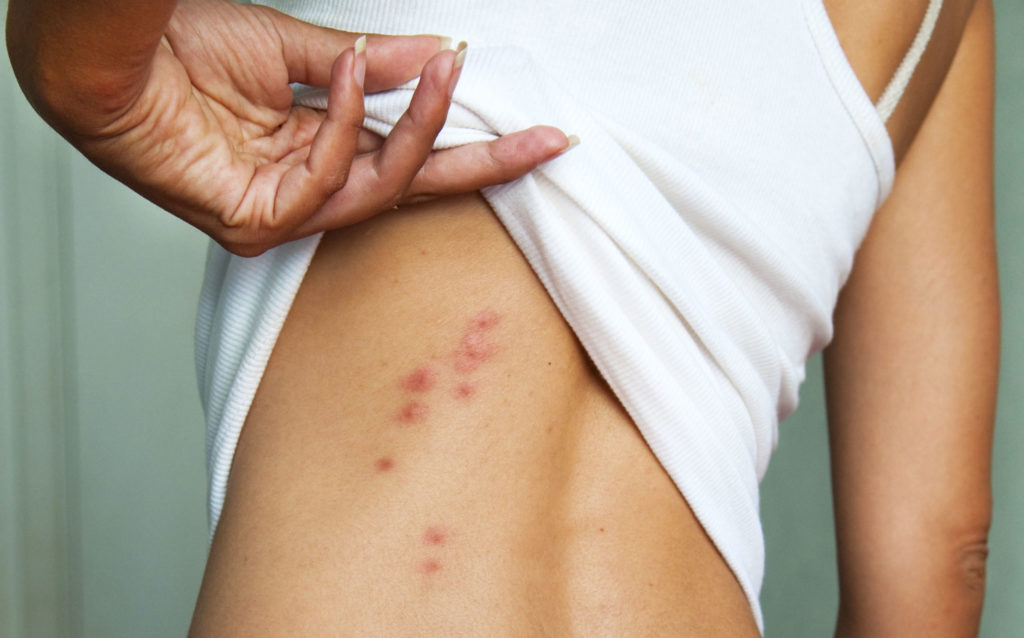Roaches are creepy.
But the thought of them biting you makes them even more horrifying.
But, I have good news.
While roaches can and will bite humans, it’s highly unlikely that they will bite you.
Roaches prefer not to bite humans but will do so if there are no other food resources around.
Cockroaches are omnivores, which means that they eat both plants and meat.
Household cockroaches, in particular, will eat anything from feces to wallpaper.
They’ll also eat dead human hair and flesh.
On very rare occasions they will eat traces of food on your face and fingers.
And when desperate, they will eat your fingernails and eyelashes.
When Do Cockroaches Bite People?
It’s highly unlikely that a cockroach ever bites you.
Cockroaches typically bite people in extreme conditions.
Most reports of cockroaches biting people take place in two conditions.
1. Massive Infestations
Reports of cockroaches biting people typically happen in buildings or structures with massive infestations.
In massive infestations, the roaches may run out of food, forcing them to resort to biting a person.
Due to desperation, roaches may chew on human fingernails or eyelashes.
They may also find shelter inside the human ear and feed in there.
Massive infestations are not safe for living.
Most people will never experience such a massive infestation, let alone live in one.
2. Ships
The other situation where cockroaches have been reported to bite people is on ships.
Cockroaches stranded on ships with very little to eat will resort to biting humans.
What Types of Cockroaches Bite?
Any species of cockroach can bite you, but it is more likely to happen with the two most common household cockroaches:
- American cockroaches
- German cockroaches
German cockroaches feed on humans’ dead skin and the food residues left on the faces and hands.
American roaches will also bite if they come across food residue on human bodies.
Where Will Cockroaches Bite People?
Cockroaches are nocturnal, so they’ll likely bite you at night.
They typically bite humans on the face, mouth, hands, and fingers.
Roaches like these spots because there’s typically food residue on them.
Do Cockroaches Bite Dogs or Cats?
Yes. But very unlikely.
Roaches will prefer to leave your dogs and cats alone.
But, if you have a significant infestation and the bugs can’t find other food sources, they may bite your pets out of desperation.
It’s more common for dogs and cats to kill and try to eat roaches in smaller infestations.
Do Cockroaches Have Teeth?
Cockroaches do not have teeth in the traditional sense.
But they do have the cockroach equivalent of teeth called Maxillae and Mandibles.
Roaches, like most insects, use their mandibles to cut out pieces of food for swallowing.
In contrast, they use Maxillae to crush and grind food so they can easily digest its nutrition.
What Do Cockroach Bites Look Like?
Roach bites are small bumps (1-4 mm) with a bright red color.
You’ll often find these bumps far apart, rather than lumped together.
Cockroach bites can cause the skin to swell up and become itchy.
Sometimes, the area can be infected and fill up with pus.
In this case, the roaches bite may swell as large as your hand.
That said, roaches rarely bite. And infection from their bites is even rarer.
How to Tell If a Cockroach Bites You?
Because cockroach bites look very similar to most insects, it can be challenging to identify if you have genuinely come from a roach.
The easiest way to be sure if a cockroach bit you is if you catch them biting you.
Or at least see it crawling off your body.
Cockroach Bites vs. Bed Bug Bites?
Cockroach bites are slightly larger than a bed bug bite. They also tend to be spread apart.
On the other hand, bed bugs tend to bite in a line or groups of three.
With bed bugs, you’ll usually find small red bumps in a zigzag pattern or a line typically surrounded by blisters or hives.
You’ll also typically find roaches bite on the hands, arms, or around the torso.
On the other hand, bed bugs are typically located on the face, neck, back, hands, and arms.
Cockroach Bite Examples
Here are some examples of cockroach bites.
You can see that they are large red bumps that are typically not as grouped up as bed bug bites.


Bed Bug Bite Examples
Here are some examples of bed bug bites.
You can see that they are much larger and typically located in a small region.


Are Cockroach Bites Dangerous?
No. Cockroach bites aren’t dangerous.
Unlike other biting insects, such as mosquitoes, cockroaches’ bites don’t transmit diseases.
That said, common household roaches such as American, German, and brown-banded cockroaches carry diseases causing bacterias.
These critters walk around filth and feces and easily spread bacteria and other pathogens.
These bacteria can cause salmonella and infections such as staphylococcus and streptococcus.
According to the World Health Organization (WHO), cockroaches can also cause dysentery, diarrhea, cholera, and typhoid fever.
Another often overlooked side-effect of cockroaches is the allergic reactions they cause in human beings.
Research by the Asthma and Allergy Foundation (AAFA) has shown that the enzymes found in excrement, shedding body parts, eggs, and saliva can trigger both allergic reactions and asthma attacks.
Having an American cockroach in your home is especially concerning if you or a member of your family member has asthma.
How to Treat Cockroach Bites?
Unless you have an allergic reaction or infection, there is not much you can do to treat a cockroach bite.
You can, however, alleviate the itchy feeling and wait until its gone.
Here’s how
1. Wash affected area with soapy water:
Washing your bite will help remove the germs on your skin and prevent infection.
2. Apply Antiseptic
Aside from using soap to clean the bite, you can also use alcohol as an antiseptic.
Pour alcohol on a cotton ball and apply it to the bites.
Other antiseptic alternatives you can use are witch hazel and tea tree oil.
3. Apply Icepack
A cockroach bite, like most insect bites, can be itchy.
To alleviate the itchiness, place an icepack on the bite.
4. Get over the counter Medicines or Creams:
If you prefer not to use an icepack, over the counter antihistamines are great alternatives to soothe the itchiness.
5. Visit a doctor:
If your bites get worse over time, visit your doctor.
Your doctor will be able to address any excess inflammation or infections with proper treatments.
How to Prevent Cockroach Bites?
The best way to prevent a cockroach bite is to eliminate them from your home.
But that is easier said than done.
If you need to prevent a cockroach bite there are a few things you can do.
First, cockroaches are not going to attack you.
They will crawl on your body as you sleep and bite you.
To prevent this you can spray insect repellent on your skin as you sleep.
Another option is to spray insect repellent on the floor around your bed.
Most insect repellents have a residual effect that can last between 12 and 24 hours.
The chemical DEET found in insect repellents is effective against many types of insects including cockroaches.
A natural way to keep cockroaches away is by using essential oils.
You can use them as a spray around your bed to deter cockroaches.
Another way to prevent cockroach bites is to install a mosquito net over your bed.
This will prevent any cockroaches from being able to climb onto your bed and get access to your body.
